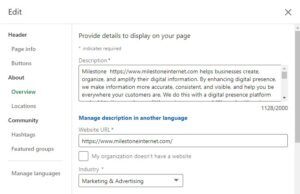
Healthcare professionals have a lot to gain from social media, but you need to be aware of some basics before you use it. Social media can present a dangerous place for information regarding health. Twitter and Facebook have been devoted hubs of information on the latest coronavirus epidemic. Inaccurate and misleading information can be posted by users. This is why it is so important for medical professionals that they fact-check the information. In addition, you should check the privacy settings of every account you use to ensure they're not infringing on anyone's information.
Challenges of social media in healthcare
Even though social media is becoming more popular in healthcare, not all stakeholders are ready to embrace the changes. Most healthcare stakeholders, including doctors, academic centers, and ministries are unaware of the dangers that these platforms pose for patients. Many people are not aware of the potential health risks and harms that posting health information can cause and choose to ignore them.
Patients using social media for medical purposes could end up making new appointments with a different doctor due to discussions with patients. This leads to shorter relationships between doctors and patients. Some patients even seek second opinions because they have had negative experiences with their current doctor. Others may just change doctors through online discussions with patients. It is not yet known how widespread this phenomenon will be, but there are already signs that it's a problem.
Impact of social media on public healthcare
Although social media adoption may seem minor to some health departments, it is becoming an important part of community engagement. Healthy People 2020 reveals that the goal of health departments to increase people's access to information and health services is a key objective. The SHD baseline study sought to identify the use of social media by health departments, which tools they most frequently use, and how these platforms can be used interactively.

While there are many concerns about social media's impact on public health, companies are taking steps to address them. Social media platforms often have community guidelines and Terms Of Use that regulate what content can be shared. They also have mechanisms in place to handle violators if they are aware. Some even report violators back to law enforcement. These measures will not solve the problem of public health promotion within this environment.
Health benefits of social media
Patients who utilize social media for health-related issues benefit from this form of communication. Social media interactions help healthcare professionals establish an equal relationship with patients, while also promoting better understanding of their condition. Patients can use these websites to voice their concerns, and also get feedback on treatments. Both the patient as well as the healthcare professional will be able to see how others react to the new methods. Social media is essential for improving healthcare services.
Hospitals and other health care organizations can update their patients quickly via social media. Social media allows for communication with the public during times of natural catastrophes. In 2009, for example, the U.S. Centers for Disease Control and Prevention used social media to update people on the spread of the H1N1 virus. In recent times, healthcare organizations used social media for keeping in touch with patients.
Guidelines for HIPAA-compliant medical professionals who use social media to provide healthcare
There are several important HIPAA guidelines for medical professionals using social networking sites in their practice. For example, posting PHI on Facebook or Twitter is prohibited unless the patient has given their express consent. The patient must also consent to the posting of images of patient information or other information. HIPAA violations could lead to fines upto $1,500 as well as 10 years imprisonment. Violators can also be fired. It is possible to follow HIPAA guidelines regarding social media use for healthcare.

First, any content posted on social media sites should never contain protected health information (PHI). PHI is information that can identify a patient. PHI should not be used in social media posts or campaigns. Updated guidelines have been issued by the American Association of State and Provincial Licensing Boards for healthcare professionals on social media. You should adhere to all these regulations when using social networking sites in your practice.
FAQ
How can you create good content?
Content should be useful, interesting, and easily shared. The best content has a clear call to action, such as a link or button that allows readers to sign up for a free trial, read more about a product, or purchase something from your site. You should also include visuals in your content to make it easy to share across all media.
Is a Content Marketing Strategy right for me?
A Content Marketing Strategy is perfect if you know exactly what you want to communicate.
But if you're unsure where to start, here are some questions to ask:
Do I need my business to communicate something particular? Or do I want to create content that resonates with general audiences?
Is it better to generate leads or convert visitors into buyers?
Is it one product I am trying to promote or multiple products
Are there people I'd like to meet outside of my industry, or am I open to reaching them?
A Content Marketing strategy is what you need if you answered "yes" any of these questions.
How can I improve the content marketing strategy of my company?
By focusing on content and distribution, you can improve your content-marketing strategy. You must first understand your ideal customer. Also, find out where they are online. Once you have this information, it is possible to tailor your content so that they are interested in what you are offering. The second is to develop a voice and style unique enough to distinguish yourself from your competition. Third, you need to figure out how to distribute your content effectively.
Is content marketing simple to measure?
Yes! It is part of the process to measure results. It allows you to assess whether your efforts have been successful and if there are any changes you should make.
You can track visitors coming from many sources (email, social media and paid advertising) and track conversions like sales leads, purchases, and organic searches.
These metrics tell you which parts of your content are performing well and where you have the greatest potential.
Statistics
- Content marketing produces 3X more leads per dollar spent. Content marketing costs 62% less than traditional marketing. (criteo.com)
- An example of an overarching goal could be: "In 2022, we want to achieve a 20% increase in revenue created by organic content and generate 15,000 MQLs with a budget of $30,000." (semrush.com)
- To further show the importance of this, 89% of people have stopped doing business with a company because of a poor experience. (neilpatel.com)
- Forty-seven percent of buyers view 3 to 5 pieces of content before engaging with a sales representative. (mailchimp.com)
- According to our research, brand awareness, attracting traffic, and generating leads remain the key content marketing goals in 2022. (semrush.com)
- Measure your goals with a progress indicator of 0-100%. Make your goals collaborative and transparent (semrush.com)
- According to our research, 65% of companies with very successful content marketing in 2021 ran content audits at least twice a year. (semrush.com)
- In fact, would pay more for a better customer experience, and 86% of B2B buyers would pay more. (neilpatel.com)
External Links
How To
How can I get started with content-marketing?
For businesses to reach potential customers and create leads online, content marketing is a powerful tool. It helps you connect with prospective clients by providing helpful information on products and services.
Content marketing encourages trust among customers, which leads to increased sales conversions.
Start by creating a blog. Blogs are user-friendly platforms that enable you to post new articles every day.
This allows people who have read your work to return often. You can also use social media sites, such as Facebook or Twitter, to share pertinent news and information.
YouTube allows you create and upload videos. These videos can educate viewers on topics related to your business.
Finally, you can create infographics using tools like Canva. Infographics allow you to visualize data. They can be used to explain complex concepts and make it easier to absorb information.
Your chances of reaching new readers are greater if you post more often and consistently.